Robin Storey's Blog, page 11
March 19, 2014
Why Writers Should Keep a Journal – And Why I Don’t
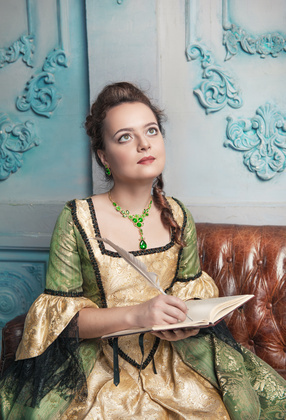
Dear Diary...
One of the things on my daily to-do list, along with yoga, meditation and becoming independently wealthy, is writing in my journal. Daily journalling is extolled by many famous writers, as in this post on PolicyMic – 6 Brilliant Writers on the Importance of Keeping a Journal.
Creative writing teachers also recommend it, as a way of :
Getting negative feelings off your chest which may be getting in the way of your writing
Warming up your writing muscles, similar to warming up before physical exercise
Forestalling or overcoming writers block – the act of writing, no matter what it is, will get you in the flow
Helping you to come up with inspiration or ideas for stories or novels, which will often occur to you as you’re writing.
So I know the theory, and I’ve even got a journal – an online Penzu journal. But time is the big drawback – I just don’t seem to be able to squeeze an extra twenty minutes into my day to write in it. And every now and then it pops into my inbox with a little message – ‘your journal awaits you’ – patient and unaccusing, which makes me feel even guiltier for neglecting it.
But if I thought my journal had any chance of being published and lauded as a literary masterpiece, like Virginia Woolf’s A Writer’s Diary, or as a lifelong serial, such as The Diary of Anais Nin Volumes 1 to 7, it would certainly be an incentive to not only increase my input, but improve the quality.
When I do find the time to put in an entry, here’s a sample: ‘I don’t really feel like writing today but I have to so I’m sitting here waiting for inspiration to strike. The ending of my novel is not working and it’s frustrating me – maybe I should take a day off to get some perspective. No, that’s a cop-out. Get on with it. Is that the postman? Gotta go.’
Hardly the stuff of literary posterity, and in a journal written for my eyes only, I'd find it difficult to come up with erudite observations such as: ‘I shall have to accept the fact, I’m afraid, that her mind is a very thin soil, laid an inch or two deep upon very barren rock.’
Virginia Woolf in her diary, describing fellow author Katherine Mansfield, after reading her novel Bliss. If she read my scribblings she'd make much of the barren rock, with no mention of thin soil.
Or this from Anais Nin’s dairy 1931 – 34: ‘If what Proust says is true, that happiness is the absence of fever, then I will never know happiness. For I am possessed by a fever for knowledge, experience and creation.’
To be fair, I could conceivably have written something similar before my first coffee of the day.
If, like me, you like the idea of keeping a journal but are having a hard time committing to it, here are a couple more posts to motivate you: Why Keeping a Journal is so Important by Bryan Hutchinson and The 7 Benefits of Keeping a Daily Journal by Michael Hyatt.
Okay, Penzu, I’m coming.
Do you keep a journal and does it benefit your writing? Or do you think it's a pointless exercise?
February 24, 2014
What advice would you give your younger self?
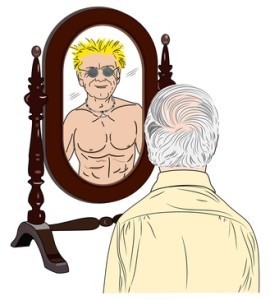
'Don't get old.'
What advice would you give your younger self, assuming your younger self would have listened to an old crock like you?
And what if you had to do it in only three words? This is the hard bit, because we baby boomers do tend to rave on about the days ‘back in the sixties’ of black and white TV, waiting a week to get your photos back from Kodak and long distance calls being constantly interrupted by a nasal, ’Your three minutes is up, do you wish to extend your call?’
The Huffington Post recently posed this challenge to their Facebook fans. You can read some of their responses here. It’s surprising how much you can deduce about a person’s life from those three words, even the flippant reply from one man – ‘ Pull out quicker.’
The answers that resonate most with me are Believe in yourself and Trust your intuition. Writing has been my passion since schooldays and the only occupation I was interested in pursuing was journalism. Even back in the seventies there was a lot of competition for jobs in the industry and I didn’t have the confidence in my abilities to jump in regardless and give it a go – I was defeated before I even started. It was not until I was in my late thirties, divorced with young children, that I plucked up the courage to begin a freelance writing career.
Self-belief is something that many writers struggle with – it’s easy when you’ve got plenty of writing gigs and your books are selling, but harder to maintain when the work dries up or you’re having problems getting into your next novel. All the more difficult because it’s a solitary occupation and much of the time, particularly if you’re a novelist, you’re relying on yourself for validation. Sometimes you just have to give yourself a slap in the face with a wet fish, or get someone else to do it for you, like this.
Or read Margaret Atwood’s ten rules for writing fiction, particularly number seven – Nobody is making you do this: you chose it, so don’t whine.
As for trust your intuition, I’m a firm believer in this one. When you’re making major life decisions, you can be as rational as a lecture in quantum physics and draw up lists of pros and cons until you get writers’ cramp, but if your gut is screaming ‘No!’ you need to take notice of it. Assuming it has nothing to do with last night’s Indian curry.
One of the few times I’ve acted against my gut feeling resulted in an unhappy and short-lived marriage. But it was a learning experience – one way of bringing home to me the immutable truth of that adage. In a blog post on Care2, Jonah Lehrer, author of How We Decide, says that the rational mind is only capable of making minor concrete decisions, like choosing between two brands of car insurance. When we’re making decisions that will have lasting repercussions on our lives, there are too many factors for the poor over-worked brain to consider, so we’re better off deciding from the gut.
That feeling we sometimes get, that a person or a situation feels right – there was no struggle, it just fell into place as if it’s meant to be – that’s intuition working at its best.
What three words of advice would you give your younger self? Share them with us in the comments below.
February 7, 2014
Do The Thing You Think You Cannot Do
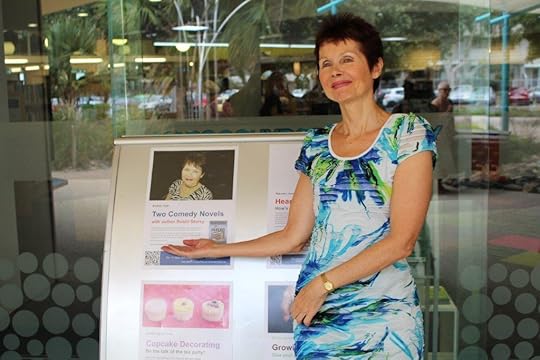
Author talk with Robin Storey
Last week I confronted one of my lifelong fears – public speaking. I did my first author talk at my local library.
If anyone had told me even a year ago that I would be speaking in front of 40 people I would have quaked at the knees and squawked, ‘No way!’
The talk went over much better than I’d dared hope, despite my catastrophic nightmares of finding myself naked and trying to hide behind the lectern or having a brain freeze in the middle of it and forgetting where I was. I’m still on a high from my success.
Two things spurred me on to do it. The first was the realization that marketing is an inevitable part of being an author these days, and there’s only so much online marketing you can do. People relate to real people and readers love to meet authors in person. And they’re often much more likely to buy your books if they’ve met you and like you and heard you do a reading from your novel. So the author talks, book signings and interviews are all part of the process.
The second was that the issue of public speaking had been rattling around in the back of my mind for years. I guess I instinctively knew that sooner or later I would have to deal with it. Who was it who said that the thing you’re most avoiding is the thing you most need to do? Eleanor Roosevelt put it succinctly – ‘You must do the thing you think you cannot do.’
Writer and blogger Jeff Goins wrote a very inspiring post called Stop Being Afraid. His words are always simple, clear and direct. As he says, courage isn’t the absence of fear, it’s the willingness to face it despite how you feel. You can never get rid of fear, but you can learn to not let it paralyze you. And two of his other statements also resonated with me.
‘Fear is asking for advice when you already know what to do’ and
‘Fear is waiting for more information before acting on what you already know.’
In other words, fear makes us procrastinate, makes us think of a hundred reasons why we can’t do something, spend days, weeks or even years in research and ask everyone’s opinions and advice. When deep down you know exactly what you need to do. It’s just too scary to take that first step.
I know all these things because this is exactly what I’ve been doing. Putting off setting myself up as a fulltime freelance writer. I’ve dipped my toe in the water and hastily pulled it back out again. Many times. I’ve done lots of writing part-time, but not enough for me to give up my day job, my regular income.
It’s comforting to see that money appear in my bank account every fortnight. Comforting but stultifying, because writing is what I was born to do. When I’m writing all’s right with the world and it gives me a natural high. But it’s a scary thing to do it full time, to push away from the solid river bank of my job into the swirling current of being a freelancer.
But having faced one fear has had a flow-on effect. If I can get up and speak in front of a roomful of people, which I have been avoiding for years, why shouldn’t I be able to make a living as a freelance writer, which I have also been avoiding for years? Logically, no reason at all. But fear is an emotion and emotions don’t always respond well to logic.
Until you decide it’s time to deal with those emotions, until the restlessness and frustration and the urge to achieve your goal or fulfil your dream becomes more powerful than the fear of doing it.
Time to take a deep breath and step out.
Have you battled a fear and won? Or still plucking up the courage? I'd love you to share your experiences in the comments below.
January 21, 2014
Taking the Guilt out of Guilty Pleasures

My guilty pleasure
I love the concept of the guilty pleasure – something you love doing, but know you shouldn’t, its illicitness making it all the more enjoyable. The other day I indulged in one such pleasure – I went to the movies on my day off when I was supposed to be writing.
Having a part-time job, the days I have off are precious and normally nothing is allowed to take precedence over my writing. But I wanted to see this particular movie, my partner wasn’t interested in seeing it, and I didn’t want to wait until it came out on DVD. So I went to the Wednesday 2pm session. (I got some writing done in the morning, so I guess on the scale of hedonism my guilty pleasure was only a half-hearted effort).
The movie was Philomena, based on the true story of Philomena Lee, a retired Irish nurse, who enlists the aid of a world-weary journalist to help her search for her son, whom she was forced to give up for adoption when he was 3 years old. It’s an excellent film with pitch-perfect acting from Judi Dench and Steve Coogan. Here's a preview trailer.
I love the whole movie experience – the escapism into another world, the immediacy of it and the total absorption of the senses. (And if you’re eating popcorn at the same time, all five senses are catered for). If I wanted to rationalise my guilty pleasure I could say I was studying my craft, which I was. Writers can learn so much from movies, as most movie scripts follow the classic narrative structure of storytelling – setup, confrontation and resolution.
As I do when I read books, I find myself analysing all the components of the movie – what parts of the narrative worked, what parts didn’t, if the characters rang true, and so on. Some people believe that analysing a book or movie while you’re reading/watching it spoils the enjoyment, but I’ve found that it actually enhances it – the fact that I can appreciate the skill involved adds to the pleasure, especially as I can use the knowledge I’m gaining in my own writing.
So, where were we? Oh yes, guilty pleasures. What’s yours? Diffuse some of your guilt by sharing it here.
December 17, 2013
55 Things I Love

Watching waterfalls - one of the things I love
Writer Judy Lee Dunn recently wrote a called ‘Can you name 99 things you love in 10 minutes?’ It sparked off a wave of reciprocal posts as others did the same exercise. It sounded like a fun thing to do so I decided to join in, but my poor brain doesn’t work well under pressure and it came to a dead halt as soon as I put the timer on.
Consequently I only came up with 55 things I love in 10 minutes. Here they are. Note that they are not in order of preference, as I hastened to assure my partner when he peered over my shoulder and noted that ‘time with my partner’ was number 20. (I don’t think he was entirely convinced).
The sound of the ocean
The smell of coffee
Curling up in my armchair with a good book
Walking on the beach
Travelling to different countries
Chocolate
A glass of chardonnay at the end of the day
A hot shower
BBQ brunches on the beach
Going to the movies
Going out for dinner
Laughing till I cry
Walking in the door of home after work
A whole day with no plans or appointments
Day dreaming
Meditating
Browsing in bookshops
Browsing on the internet
Spending time with my children
Time with my partner
Swimming on a hot day
Watching waterfalls
Bushwalking
Gelato
Sleeping in
Baking
Listening to my favourite music
Live theatre
The endorphins after a good workout
Having a massage
Writing ‘The End.’
Having my hair washed
Looking through old photos
Hanging out in the library
Riding pillion on a motor bike
Writing when I’m in the zone
Discovering a new author
Writers festivals/conferences
A healthy bank account
A gold lotto win
Dancing
Watching Latin American dancing
How I feel after a yoga session
The smell of meat cooking on a BBQ
A melt in your mouth steak
Dinner at home by candlelight
Reading the week-end newspapers
Reading a book on the beach
Having a pedicure
Falling in love with an item of clothing and finding it’s on sale
Receiving compliments
Giving compliments
Watching old TV shows on you-tube
Slurping on a mango
Cocktails
Try the exercise yourself - if nothing else, it will make you appreciate the good things in your life. Do any of mine resonate with you?
November 7, 2013
WHAT IS LITERARY FICTION?
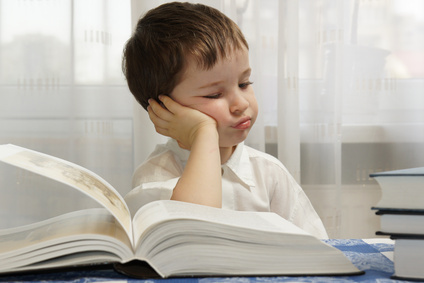
Literary fiction? Bleah!
'What’s literary fiction?' my partner asked me the other day.
I struggled with my reply – mainly because I’m not sure of the answer myself. The glib reply would be ‘books that have no plot and you need a degree in English Literature to read.’ But that would be unfair to those who write in that genre as it isn’t always the case.
I recently attended the Australian Genre-Con, a conference for genre writers, in which there was more than one sly reference to ‘big L’ writers who think they’re a cut above other writers and behave like spoilt rock stars at literary festivals. It emphasized the large divide there’s always been between those who write literary and popular fiction.
Finally I told my partner that according to my perception, literary fiction deals with the big issues of life, but in a complex manner that you have to dig deep to find. It’s often about a character’s emotional journey, meaning there’s not much action, and that’s where the accusation of ‘no plot’ stems.
The Huffington Post defines the difference as this: popular or mainstream fiction is driven equally by plot and character (in some genres, eg adventure/action and thrillers, the plot sometimes takes precedence over character – my comment) and must have a premise that instantly hooks the reader, conflict that is resolved at the end and is for the most part, easily read and comprehended. Literary fiction is driven by ideas and themes and the style of prose is of paramount importance and sometimes controversial. To quote: ‘The plot isn’t the main focus in literary fiction; rather, the history, social issues, and character developments that are a part of the story take precedence.’
But not everybody agrees with that definition. Author Nathan Bransford argues that plot is just as important in literary fiction as in other genres and that good literary fiction does have a plot – it’s just harder to find. He cites Cormac McCarthy and Elmore Leonard as genre busters - ie they write literary fiction that also happens to be popular and sells well. There are a number of other authors who are said to fall into this category – Jane Austen, Tim Winton, Kate Grenville, Khaled Hosseini, just to name a few and novels which have transcended the literary/popular fiction barrier include classics such as To Kill a Mockingbird, The Great Gatsby, Jane Eyre, Lord of the Flies and Of Mice and Men.
My burning question is: who decides what is literary fiction? When I visited the Goodreads list of popular literary fiction novels, there were quite a few books there that I wouldn’t have thought would be classified as literary fiction. The debate of literary vs popular fiction will never be resolved and one which I think is ultimately meaningless. I’ve heard it said that classification of books only ever happened because booksellers needed to know what part of the bookstore to place the books.
In the end writers, if they’re smart, will write what they want to write and what feels natural to them, regardless of how well it sells and readers will buy what appeals to them, regardless of its classification. As an author, my goal is to write books that people enjoy reading. Simple as that.
What's your view? Do you think it's a load of codswallop? Or not?
October 8, 2013
WRITERS’ RESEARCH – HOW FAR WOULD YOU GO?

Google Earth - armchair research for writers
One of the perks of being a writer is the research you often have to do for the authenticity of your story, characters, setting etc. While writing my novels I’ve learnt about roof tiling, computer hacking, being in jail, various mental illnesses and sex shops, to name a few. Information I’ll probably never need in my own life (most of it, anyway) but interesting, nonetheless.
But I’m a wimp compared to some writers, who go all out to experience themselves what their characters are going through. Australian-Canadian crime writer Tara Moss is known for her in-depth research, which includes shooting firearms, being set on fire, flying with the RAAF and earning a certificate as a private investigator. In a recent interview she discussed her experience of being choked unconscious by Ultimate Fighter ‘Big’ John McCarthy.
While I can’t see myself going to those extremes (a paper cut is enough to make me take to my bed) I agree that in these days of enhanced reader knowledge and sophistication it’s important to get your facts right. And with sites like Google Earth you can write a book set in a place you’ve never been to and make it sound pretty authentic.
Australian author Nick Earls, in his book of short stories Welcome to Normal, did extensive research on the town called Normal in the USA by means of Google Earth, literally trawling the streets from the comfort of his office. And he did the same for Andalucia in Spain, where another of the stories, The Heart of Robert The Bruce, takes place. He does such an expert job of description and creating ambience, that unless you knew otherwise, you’d assume he’d been there himself. He described his research process in this post.
But amazing as it is to be able to do this, it’s still armchair travel and nothing beats visiting a place yourself if you’re going to write about it. You can’t experience smells, sounds and atmosphere on Google Earth - the pungent aroma of the markets, the blare of the traffic, the sweltering heat, the tension of the crowds. You can imagine them, or ask other people who’ve been there, and maybe you’ll get it right. But you won’t have the edge, the element of surprise and discovery, of your own feel and impressions of a place that are unique to you and which give the setting flavour and originality.
A great reason, if you need one, to travel. I’m going to set my next book on a remote South Pacific island...
Can you top Tara Moss for 'out there' research? Any suggestions for my South Pacific island?
September 16, 2013
YO HO HO AND A BOTTLE OF RUM!
I don’t know about you but by this time of year my social conscience has worn very thin. It seems there’s a worthy cause for every day of the year, from the popular Red Nose Day, Jeans 4 Genes Day and Walk to Work Day to the lesser known National Condom Day (14 February, of course) and World Naked Bike Ride. (You missed it - it was 10 June.)
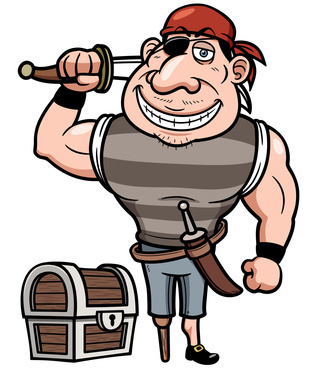
Give me all your booty or I'll cut the other leg off!
All commendable no doubt, but if I gave to all of them, I’d be a charity case myself.
But avast me hearties! Fear ye no more! International Talk Like A Pirate Day is upon us – aye, on 19 September. You don’t have to walk for miles, buy a bike, give anything up or go to the chemist. The aim of the day is simply to talk like a pirate.
'Why?' I hear you cry heartily. Because many years ago in the USA John Baur and Mark Summers were playing racquetball. I’m not familiar with racquetball but I’m guessing it’s not particularly riveting, because during the game they broke out into pirate lingo. Then it struck them – why not have a day when everybody talks like a pirate? The logical date was September 19, Summers’ ex-wife’s birthday.
But the road to international acceptance was not paved with gold booty. Despite their best efforts the idea was met with a high sea of apathy. Until 10 years ago, when humorist Dave Barry took up the cause and wrote an article about it in the Miami Herald, and since then the idea has taken off like the Jolly Roger after Mad Sally’s treasure chest. Dave was so overwhelmed by the idea he found it hard to list the practical benefits, so I’ll do it here.
*There’s no money involved. You won’t be asked to make a donation to a home for refugee one-legged pirates, so you can keep all your loot to yourself.
*You don’t have to wear anything special – eye patches and stuffed parrots are optional.
*You get a chance to be politically incorrect for a day. Your female colleagues can’t accuse you of being sexist when you sidle up and growl, ‘Arrrgh, me buxom beauty, how ‘bout we plunder petty cash and go buy some grog.’ And you can’t be insulted if they come back with ‘I’d rather drink out of the slop bucket, yarr pox-infested scurvy dog.’ And it’s probably the only time you’ll get away with calling the boss a bilge rat.
*It’s a good opportunity for some office team building. Turn your workplace into a pirate ship for the day. Assign pirate names and tasks – the office junior can make the coffee from the bung hole, the receptionist can be the lookout – ‘Customers ahoy!’, the sleazy guy in sales can clean out Davy Jones’s locker, and so on. Create a treasure map for people to find their payslips – failure means walking the plank off the top floor.
*If that sounds like too much work, yarr yellow-livered landlubber, you can turn it into a social occasion. Ask everyone in the office to bring in a dish starting with P. All the good foods start with P – pie, pizza, pudding. And don’t forget the traditional bottle of pum.
So, me comely wenches and brave buccaneers, dig deep and find your inner pirate, and have a swashbucklin’ good time! For more bounty, set sail for the official website.
Any other suggestions, me hearties, for a jolly old stoush on September 19?
August 21, 2013
INTERNET DATING – THE BALD FACTS

Is he Mr Right?
The night I was rejected by a sixty year old transvestite with a walking stick was the turning point for me. I was at a charity function and my act of charity was asking Erica, as he liked to be known, to dance.
“No thanks,” he said, with a swish of his skirt and a toss of his wig. You could have knocked me down with a feather boa. Had I, in the six months of self-imposed exile since my relationship ended, become so undesirable?
The next day I decided to take the plunge and immerse myself in the uncharted waters of internet dating. Not from desperation, of course, purely out of curiosity.
I logged into one of the dating sites and browsed the profiles of all the men in my age group who lived in my city and looked reasonably presentable (i.e., no scruffy beards, ponytails or multiple chins). I was amazed at the number of romantic men who enjoyed moonlight walks along the beach. I’d made many a moonlit pilgrimage on the beach looking for one, but all I encountered was frisky waves and a stiff wind.
And when they weren’t on the beach these same men were snuggled up on a bearskin rug in front of a crackling fire, sipping on a pinot noir while listening to Diana Krall. Who are you kidding, guys? We know you’re really slouching around in your boxer shorts on a threadbare carpet in front of a bar heater, guzzling beer and watching The Family Guy.
What do these men want out of a relationship? “Uncomplicated friendship” (sex as often as he wants as long as you don’t interfere with his other “friendships”), “Discretion can be assured” (would prefer if you were already in a relationship as he is too) “open mind”, (bring a friend, video camera, toys, or all three), “A little love and passion” (forget the love), “Let’s meet for coffee and see where it takes us” (hopefully straight into your bedroom).
With trepidation I posted my profile on the site, opting not to include a photo. I wanted to meet a man who was prepared to go beyond the superficial and meet me without knowing what I looked like. I sat back and waited for the deluge of replies.
And waited. After two weeks, there was not one response. I decided to start the ball rolling myself. I sent virtual kisses to any man I liked the sound of whose spelling and grammar met my standards. (We writers are unapologetic snobs when it comes to literacy). I did so much virtual kissing that my virtual lips were becoming somewhat chafed, but still no response. I was getting anxious – maybe Erica could give me some tips on where I’d gone wrong.
I checked my profile again and discovered that in the hair type category I’d accidentally ticked “bald” instead of “black.” I was relieved and at the same time annoyed. How dare all those potential suitors be so shallow as to reject me because of a simple lack of hair? A woman’s hair may be her crowning glory, but for some, their assets lie elsewhere.
In the end it all comes down to appearance. Except if you’re a bald woman, then no-one wants to know you.
This story has a happy ending. After a miraculous hair transplant I dated several men I met on the dating site. And then met the man of my dreams, though not on the internet, and we’re living happily ever after. But I’m sure (well, fairly sure) if I was bald it wouldn’t have made any difference to him.
My newly published novel, romantic comedy Perfect Sex, is about internet dating. It's fiction, but influenced, of course, by my own experiences. You can buy it as an e-book on Amazon for $3.99. Print version coming soon.
Have you had any experiences of online dating (good or bad) you’d like to share? I’d love to hear them.
July 30, 2013
WHAT MAKES YOU LAUGH?
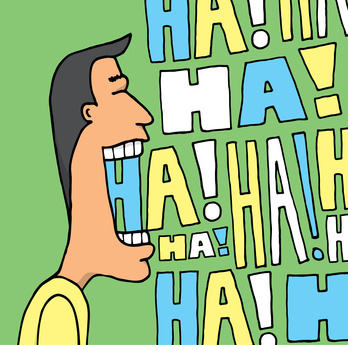
Laugh and the world laughs with you
Internationally acclaimed comedian Tim Ferguson is running a workshop on comedy writing at the Gold Coast on 10 August. There’s obviously a lot of interest in this art as his workshops are always very popular. I’ve often wondered how you go about teaching people to write comedy, given that humour is such a subjective thing. What makes one person roll around on the floor laughing will make another person yawn. One man’s Monty Python is another man’s Seinfeld.
Everyone has a sense of humour, even if it’s not readily apparent in some, and every writer has a distinct ‘voice’ when it comes to humour – some have a well-developed sense of the ridiculous or the absurdities of everyday life, others favour the ‘pie in the face’ approach and others are more subtle, leaning more towards satire than laughs.
I’m always gratified when people tell me they found my book How Not To Commit Murder witty or funny, especially if they laughed out loud. It’s reassuring to know that others share my sense of humour and that I’m not completely crazy when I find myself chuckling at something I wrote. (I know it’s bad form to laugh at your own jokes, but it doesn’t count if you’re by yourself).
I’ve categorised humour into three types:
Situational humour: in which the situation itself is funny. Comedy crime author Colin Bateman puts his characters in some bizarrely funny situations, often verging on slapstick. Novels that come to mind are The Day of the Jack Russell (a hypochondriac, multi-phobic bookshop owner gets involved in a murder investigation, which includes looking for a missing Jack Russell terrier) and Nine Inches (ex-journalist turned private eye finds himself in the middle of a feud between rival drug gangs). Here’s my review of Nine Inches on Goodreads.
Donald Westlake was a genius at creating plots in which comical scenes were almost inevitable – for example, the Dortmunder novels, in which John Dortmunder, a career crook, comes up with an endless variety of creative burglary schemes and just manages to avoid being caught by the cops. In the novel Good Behaviour he hides from the police in a nunnery, after falling through the roof. But there’s a price to pay – he must rescue one of their members who’s been taken away by her fiercely anti-Sisterhood father. Even the plot synopsis will make you smile.
Expressional humour: in which the situation itself is not inherently funny but the writer is able to describe it in such a way that it is. Nick Earls is a master of this art. His plots are simple, but the way he expresses the thoughts of the characters – often angst-ridden, insecure young males trying to make sense of relationships and the world – and his quirky take on everyday situations, makes for laugh out loud humour. Zig Zag Street and World of Chickens, two of his earlier novels, are good examples.
David Sedaris is another expert, as he shines his self-deprecating spotlight on himself and his family. His family memoir Dress Your Family in Corduroy and Denim had me in stitches. (Pun intended).
Aussie comedian Carl Barron has built a whole career on his observations of everyday life. Check him out here.
Absurd humour: where you take incongruous or bizarre subjects or ideas and put them together in such a way that the absurdity of it makes you laugh. Monty Python instantly springs to mind (think of the iconic dead parrot and cheese shop sketches). Novels in this category are often fantasy – for example, books by Terry Pratchett, especially the Discworld series, and Douglas Adams (The Hitchhikers Guide to the Galaxy, Trilogy of Four).
As in all comedy, the skill is in the delivery. You could probably come up with many more categories and blends of humour, so by all means chime in below and give me your two cents worth.
And to end on a comic note, here’s a link to one of my all time favourite Monty Python sketches, that never fails to incite an asthma attack (from laughing).



